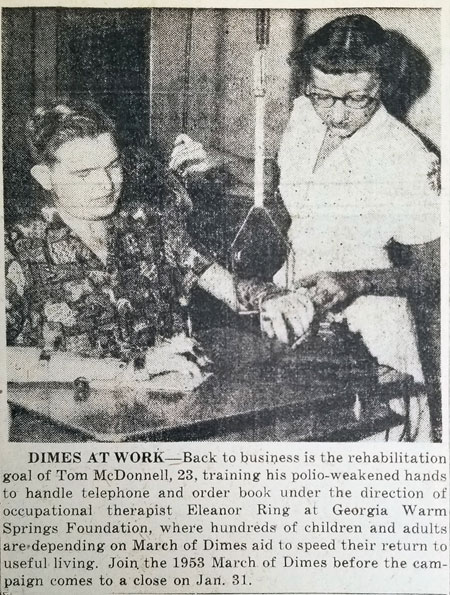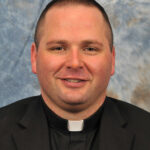By Timothy Walch
The Catholic Messenger
“It’s polio.” Americans of a certain age remember that diagnosis with apprehension and fear. Polio was a crippling illness that emerged with little warning and hit children hardest. The illness struck quickly, resulting in young ones needing to use wheelchairs or breathing machines known as “iron lungs.” With no known cause or treatment, parents were both protective and prayerful in their response.

This photograph and cutline from the Jan. 22, 1953, edition of The Catholic Messenger shows occupational therapist Eleanor Ring working with Tom McDonnell, who was recovering from polio. Timothy Walch writes about The Catholic Messenger’s coverage of polio through the years.
Polio appeared in Iowa as early as 1910 and re-emerged periodically for the next 45 years. It was not a particular concern for Iowa Catholics until the years after World War II when the number of cases increased. The first Messenger story appeared on Aug. 1, 1946. “Act Quickly, Avoid Panic If Polio Hits” read the headline.
It was good advice — vigilance and caution ruled the summers. Because polio was so contagious, many parents quarantined their children at the first mention of an active case in their community and prayed that the disease would pass them by.
In fact, asking God to intercede was an important part of the local response and, to aid families in this effort, the Messenger published articles on the power of prayer.
Indicative of this message was a story on Feb. 2, 1950: “Seven Polio Cases Break out at St. Paul [Iowa]” wrote the editor. “People Pray.”
An editorial on June 1, 1950, codified the importance of reaching out to the Almighty. The “Power of Prayer” stressed that “prayer is the solution for everything. Prayer is the only thing that can save any pressing situation.”
The editors also profiled efforts to raise money to find a cure. Thanks to the National Foundation for Infantile Paralysis with its “March of Dimes” campaign, research on a vaccine was underway. In the meantime, parents fretted and prayed.
The number of cases increased each year without relief. By 1952, the annual number of Iowa cases passed 3,500 and the level of anxiety was reflected in the increasing number of Messenger stories about polio.
Local efforts to raise money for research were led by Paul Ryan, a prominent Davenport civic leader and member of St. Paul the Apostle Parish. The Messenger published a story about Ryan on the front page on July 12, 1951, and over the next several years provided regular updates.
In addition to stressing the need for prayer and supporting the campaign for a vaccine, the Messenger also shared practical advice on what else could be done. In editorials published in 1952 and 1954, the paper stressed good public health practices including a limit on social contacts, teaching children to wash their hands regularly, and being ever watchful for early signs of polio — headache, fever, sore throat, upset stomach, tenderness or stiffness of the neck and back.
Finally, the Messenger also featured stories of young Catholics who were meeting the challenges of their paralysis. On April 15, 1954, for example, the Messenger wrote about young Jerry Vogel, who attended St. Mary School in Keota thanks to a dedicated telephone line. The story stressed Jerry’s positive attitude and the extensive cooperation of state agencies, the local parish and private foundations.
By 1955 the Messenger could report positive news. Dr. Jonas Salk of the University of Pittsburgh had developed an effective vaccine. Thousands of children, including the public and parochial school students in Scott County, had been part of the trial test.
The success of the Salk vaccine brought joy to Iowa and the nation. On April 14, the Messenger editors said it all in a headline: “After 17 Years —Victory!” In addition, a Messenger editorial on May 19 urged readers to apply the lessons of fighting polio to another medical challenge — the ravages of mental illness.
We can do it together: that was the implicit message of the Messenger’s response to the polio epidemic. That message gives us context for our current challenge in defeating the COVID-19 virus. By exercising practical protective measures such as masks and social distancing we can limit the spread of the virus until a vaccine is available. In the meantime, it would be a good thing to say a prayer or two for the first responders on the front lines.
(Timothy Walch is a lay director of St. Thomas More Parish in Coralville and a member of the board of directors of The Catholic Messenger.)











